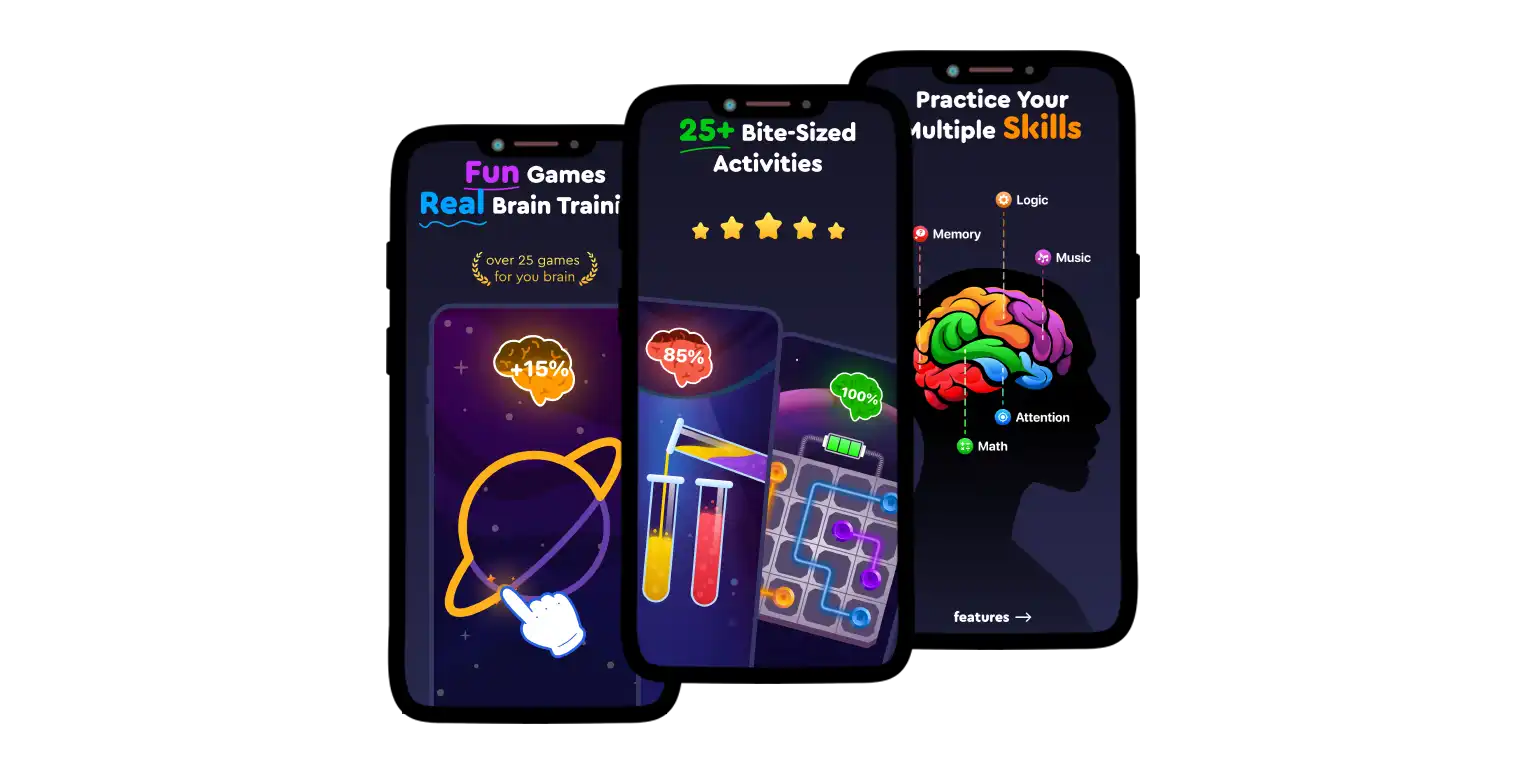Digital Dementia: How Tech is Rewiring Brains (And the AI Antidote)

Contents:
It’s not a secret that we’ve gone a little rusty with technology. More surprisingly, tech influences our memory to an extent that people are developing digital dementia.
What is digital dementia, and what are its symptoms? Let’s learn about it. Tips for digital dementia treatment are included.
Online brain games can save your brain today. A trained mind has fewer risks of developing dementia.
Digital Dementia Definition
Digital Dementia is a cognitive decline that may result from overuse of digital technology, especially among younger people.

Digital dementia symptoms include:
Reduced memory
Poor concentration
Impaired social skills
Sleep issues
The scientists are still researching digital dementia meaning. It’s a new problem for humanity, after all. The term was introduced only in 2012, in a Manfred Spitzer digital dementia book: Digital Dementia: What We and Our Children Are Doing to Our Minds.
The consensus at the moment is that digital-based dementia is similar to the early stages of Alzheimer's disease. Children with digital-based dementia are at risk of having “common” dementia in their adulthood/old age.
Digital Dementia in Kids

Kids are especially vulnerable to digital-based dementia. Children’s brains are still developing, especially in areas like the prefrontal cortex (which manages memory, attention, and reasoning).
Overuse of screens during these formative years limits healthy neural development.
Kids are using phones mainly for entertainment. The parent should introduce off-phone fun activities. Maybe some outdoor games, art, and reading. Talk more with your children, ask kids fun questions, so they can know there’s a world out there.
Digital Dementia in Adults

Adults increasingly rely on phones for reminders, contacts, directions, and notes. People like clerks are at risk, since they rely on technology mostly.
Unlike children, adults mostly use digital instruments not for entertainment, but for work. They can't completely abandon their screens, so adults have to limit their screen usage at home.
Digital Dementia in Seniors
Unexpectedly, digital-based dementia is not dangerous for seniors. A study found that among 400,000 older adults who routinely used digital devices had lower rates of cognitive decline than those who used them less.
It seems that buying a digital clock for seniors with dementia would not be a bad idea. The scientists are still trying to understand why digital dementia hurts seniors less, but technology helps them retain brain power.
Maybe when seniors use technology like a digital watch for dementia patients, they’re learning. They’re not accustomed to technology yet, so their brains are developing.

Anti-Amnesia Techniques
Can digital dementia be reversed? Yes, the effects of digital-based dementia can often be reversed or at least significantly improved, especially if addressed early. The brain has an amazing ability called neuroplasticity, and you can rewire your brain through it.
Here are some ways you can help reverse this decline. What’s poetic, some of the strategies rely on AI and technology. Things that once caused digital-based dementia can now help fight it.
1. Rebuild Memory Through Practice
When was the last time you tried to remember something without a phone? Memorize phone numbers, addresses, or daily tasks instead of relying on your phone for a change.
This way, you're training your brain, and it regains its strength. One exclusion is a digital watch for dementia patients. It’s a reminder clock for those in the late stages of dementia.
If it’s hard to use your memory, try visualizing items in specific locations, creating associations, or chunking to improve short term memory.
2. Improve Attention and Focus

When we mix our activities/tasks, it’s bad for our focus. There are two main methods for focus.
Time-blocking, when you set time for a specific goal. For example, an hour to cook dinner, and during this hour, you’re only cooking dinner. Not answering calls or cleaning.
Pomodoro method. You start a time for a short period (25 minutes) and focus on one task. When the timer is done, you have a 5-minute break, and then start the timer again.
3. Set Digital Boundaries
Designate screen-free times or spaces (e.g., during meals, before bed). We often use our phones for leisure. Instead of playing games on the phone you could try board games or drawing on paper.
One exclusion would be brain training games on the phone, as they improve focus instead of wasting it.
4. Use Physical Exercise and Sleep to Support Brain Function
The brain is a very needy organ. It needs a constant flow of nutrients, and nothing gets blood running as good as sport.
Regular aerobic activity boosts blood flow to the brain and supports learning and memory. Sleep also affects brain performance. The brain consolidates memories during deep, uninterrupted sleep. Those who sleep and train have more resilient brains.
5. Maintain Social and Verbal Memory

Surprisingly, a good talk provokes memory growth. When we have a conversation, we use recall to talk, remember our vocabulary. Not to mention storytelling, where we train our long-term memory.
Lastly, talks release hormones helpful for the brain’s development.
6. Use AI to Fight Digital-Based Dementia
Technology overuse contributes to digital-based dementia, but AI can also be used as a tool to help reverse it.
Use AI-based brain training apps that adapt to your cognitive strengths and weaknesses. These apps adjust difficulty levels in real time, helping train memory, attention, and problem-solving.
These apps also often use AI-assisted journaling and Reflection. The app summarizes your day, asks you reflective questions, or quizzes you on past entries. This improves episodic memory and deepens recall. Better than any dementia digital clock.
Here’s one brain training app that doesn’t use AI, but instead uses scientific data.
Mind Elevate

Mind Elevate keeps your memory fresh and active. With an app like this, dementia (age-caused or digital) is not scary.
Mind Elevate has over 35 games that train your brain, music perception, memory games, logic, attention, and math games.
Memory games are especially important for our topic. Games like “Martian Path” and “Astrologer” train your recall and focus. Unlike other games on your smartphone, you can play them without guilt.
You can download Mind Elevate on iOS and Android for free.





